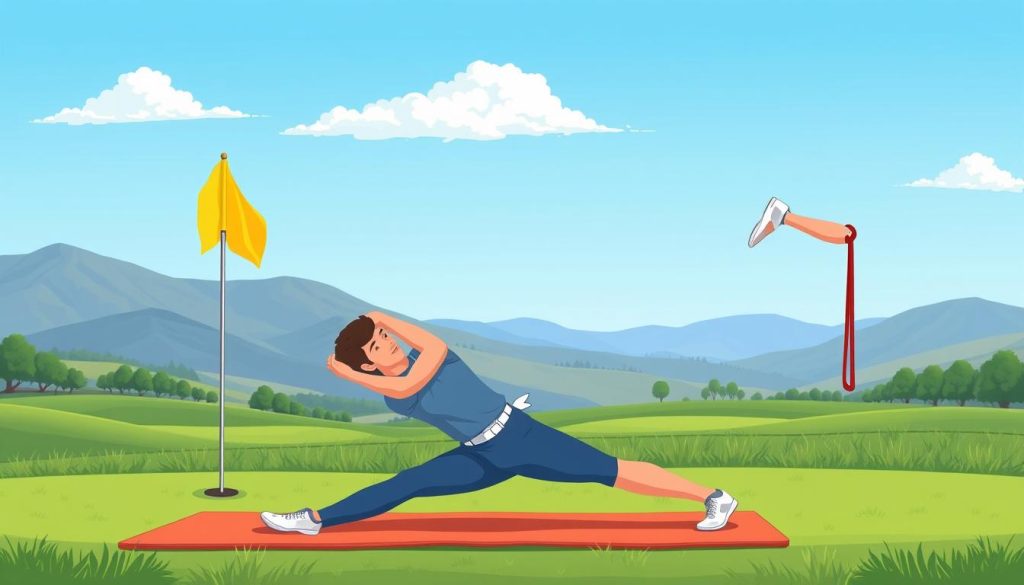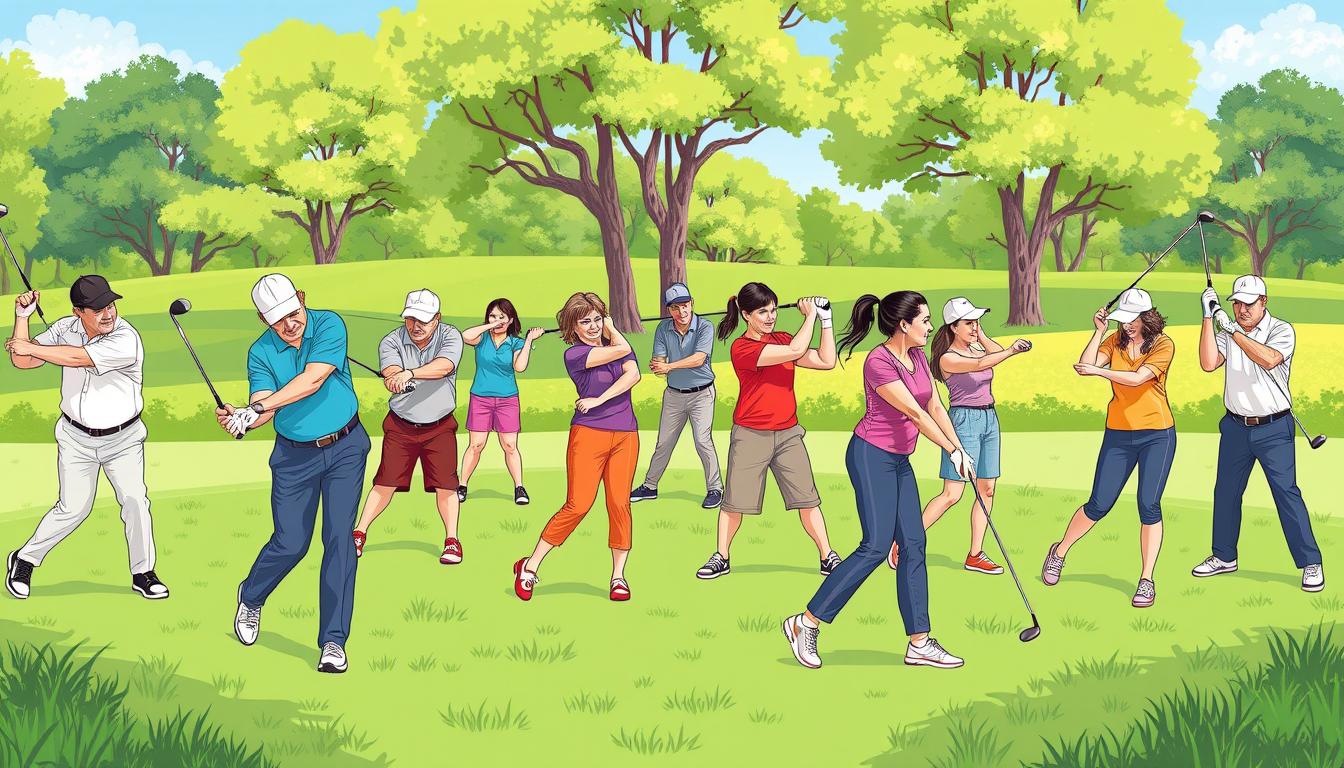Golf swing flexibility is key to your game. It helps you hit the ball harder and better. This guide will show you why flexibility matters and how to improve your swing.
Being inactive can hurt your golf game by making you less flexible. But, doing golf-specific stretches can help. These stretches work many muscles, making your swing stronger.
Most golfers, 85%, deal with lower back pain because of tight muscles. Stretching can help a lot. It might even make your swing 30% faster. Plus, 95% of golfers say stretching cuts down on pain.
Key Takeaways
- Golf swing flexibility is essential for improved performance
- Regular stretching exercises can enhance range of motion
- Sedentary lifestyles negatively impact golf flexibility
- Targeted stretching can reduce the risk of lower back pain
- Improved flexibility can lead to increased swing speed and power
Understanding the Impact of Flexibility on Your Golf Game
Flexibility is key to your golf game. A smooth golf swing needs flexible muscles and good mechanics. Let’s see how these affect your game and why they’re important.
The Role of Muscle Groups in Golf Swing
Your golf swing uses many muscles. The core, glutes, hips, and shoulders work together. Flexible muscles in these areas help with rotation and smooth movement.
| Muscle Group | Function in Golf Swing |
|---|---|
| Core | Stabilizes body, transfers power |
| Glutes | Generates rotational force |
| Hips | Enables full rotation |
| Shoulders | Facilitates backswing and follow-through |
How Sedentary Lifestyle Affects Your Golf Performance
A sedentary lifestyle hurts your golf game. Not moving enough leads to muscle loss and less flexibility. Stretching and staying active keep your muscles flexible for a strong swing.
The Connection Between Flexibility and Power
Flexibility boosts your swing’s power. Being flexible lets you swing back further and transfer power better. This means faster club head speed and longer shots.
Working on flexibility improves your swing, fights against a sedentary lifestyle, and increases power. This approach to golf fitness will make you play better and enjoy the game more.
Essential Pre-Round Dynamic Warm-Up Routine
A great golf fitness program starts with a dynamic warm-up. This pre-round routine preps your body for the course. It boosts performance and cuts down injury risk. Let’s explore the key parts of an effective warm-up.
Cardiovascular Preparation
Start with 7-10 minutes of light cardio. A brisk walk around the clubhouse or parking lot is perfect. It gets your blood flowing and muscles ready for action.
Dynamic Stretching Sequences
Then, do dynamic stretches for major muscle groups used in golf. Try these exercises:
- Arm circles: 10-15 repetitions forward and backward
- Leg swings: 7-10 swings for each leg
- Torso rotations: 10-15 twists to each side
Hold each stretch for 10-15 seconds. These movements boost flexibility and get your body ready for the golf swing.
Mobility Drills for Golf
End your warm-up with golf-specific mobility drills:
- “Thread the Needle” stretch: 7-10 reps each side
- Forward/Reverse Lunge Twist: 7-10 lunges per side
- Resistance Band Shoulder Warm-Up: 10-15 reps
These exercises focus on key areas like hips, shoulders, and spine. A proper pre-round routine takes about 20 minutes. Remember, a well-structured warm-up is your secret weapon for optimal golf performance.
Core and Hip Mobility Exercises for Golf
Improving your core strength and hip mobility is key for a strong golf swing. Exercises made for golf can make you better on the course. Let’s look at some great workouts to help your game.
Start with side plank rotations to strengthen your core. This move helps power your swing. Then, do glute bridges to get your hip muscles ready and improve your swing posture. Lunges with twists are also good for better rotation and keeping your form right.
The reclined figure 4 stretch is great for your hips, glutes, and lower back. These areas are important for a smooth golf swing. Practice every day for 10-15 minutes to see better flexibility and strength.
Add these exercises to your warm-up before playing. They get your body ready for golf, lowering injury risk and boosting your game. Regular practice will give you more power, accuracy, and better swing mechanics.
| Exercise | Target Area | Benefits for Golf |
|---|---|---|
| Side Plank Rotations | Core | Improves stability and power transfer |
| Glute Bridges | Hips and Glutes | Enhances posture and hip activation |
| Lunges with Spinal Twists | Hips and Core | Increases rotation and maintains proper form |
| Reclined Figure 4 Stretch | Hips, Glutes, Lower Back | Improves overall swing fluidity |
By doing these golf-specific exercises, you’ll get stronger core and better hip mobility. This means a more powerful and accurate swing. You’ll hit the ball farther, control it better, and be less likely to get hurt.
Shoulder and Upper Body Flexibility Training
Improving your upper body mobility is key to enhancing your golf swing. This section focuses on exercises that target your shoulders, thoracic spine, and upper back. These drills will help you achieve a fuller range of motion, leading to more power and accuracy in your shots.
Rotator Cuff Mobility Exercises
Your rotator cuff plays a crucial role in shoulder health and swing mechanics. Try these shoulder rotation drills to boost flexibility:
- Arm circles: Stand with arms extended, make small circles, then gradually increase size
- Internal and external rotations: Use a light dumbbell or resistance band
- Wall slides: Stand against a wall, slide arms up and down
Thoracic Spine Stretches
Enhancing thoracic spine flexibility is essential for a full golf swing. Incorporate these stretches into your routine:
- Seated rotations: Sit on a chair, twist your upper body to each side
- Cat-cow stretch: On hands and knees, alternate between arching and rounding your back
- Foam roller extensions: Lie on a foam roller placed along your spine, extend arms overhead
Upper Back Flexibility Drills
Improve your upper body mobility with these effective drills:
- Doorway stretch: Stand in a doorway, place arms on the frame, lean forward
- Shoulder blade squeezes: Sit or stand, squeeze shoulder blades together
- Thoracic rotations: Lie on your side, rotate upper body while keeping hips stable
| Exercise | Target Area | Reps | Frequency |
|---|---|---|---|
| Arm circles | Shoulders | 10 each direction | Daily |
| Seated rotations | Thoracic spine | 10 each side | 3-4 times/week |
| Doorway stretch | Upper back | Hold 30 seconds | Daily |
Consistently practicing these exercises will significantly improve your upper body mobility for golf. Remember to start slowly and gradually increase intensity as your flexibility improves.
Lower Body Flexibility Techniques
Improving your lower body flexibility is key to enhancing your golf game. Leg stretches for golf and ankle mobility exercises can significantly boost your performance on the course. By focusing on these areas, you’ll increase your power, balance, and overall swing efficiency.
Start with quadriceps stretches to loosen up your thighs. Then, do hamstring stretches to improve your leg flexibility. Stretching your calves is also important to prevent tightness that can affect your stance. Hold each stretch for 30 seconds and repeat 2 to 5 times on each side for optimal results.
Ankle mobility is crucial for maintaining stability during your swing. Try ankle rotations and calf raises to enhance flexibility in this often-overlooked area. For a full golf swing, incorporate standing piriformis stretches. These target hip external rotation, allowing for a more fluid motion.
| Stretch | Target Area | Benefits |
|---|---|---|
| Quadriceps Stretch | Front of thigh | Improves backswing rotation |
| Hamstring Stretch | Back of thigh | Enhances follow-through |
| Calf Stretch | Lower leg | Increases stability |
| Ankle Rotations | Ankles | Boosts balance during swing |
| Piriformis Stretch | Hips | Facilitates full rotation |
Remember, consistency is key. Perform these lower body flexibility exercises before and after every round of golf. On off days, dedicate time to this routine to maintain and improve your flexibility. By incorporating these techniques into your regular practice, you’ll notice significant improvements in your golf swing and overall performance.
Golf Swing Flexibility Guide: Step-by-Step Program
A golf fitness program is essential for a better swing. This guide will help you improve your flexibility step by step. You’ll see your golf game get better over time.
Daily Flexibility Routines
Begin each day with a 15-minute stretch. Focus on stretching your core, hips, and shoulders. Include side plank rotations and glute bridges in your routine.
These exercises target key muscles for a smooth golf swing. They help you swing better throughout your game.
Weekly Progress Tracking
Keep track of your flexibility gains weekly. Use a chart to note your range of motion. Also, record any swing improvements.
This tracking keeps you motivated. It helps you adjust your routine as needed.
| Exercise | Week 1 ROM | Week 2 ROM | Week 3 ROM |
|---|---|---|---|
| Trunk Rotation | 45° | 50° | 55° |
| Hip Flexor Stretch | 30° | 35° | 40° |
| Shoulder Rotation | 80° | 85° | 90° |
Long-term Flexibility Goals
Set realistic long-term goals for your golf fitness. Aim to increase your flexibility by 20% in three months. Improved flexibility means better balance, power, and consistency in your swing.
![]()
By following this program, you’ll get a more fluid and powerful swing. Stay committed to your daily and weekly routines. Your improved flexibility will make your golf game better, making it more fun and rewarding. Consistency is key, so be sure to integrate these golf swing technique tips into your practice sessions for lasting improvement. Over time, you’ll notice greater confidence in your posture and alignment, leading to more accurate shots on the course. Remember, progress takes patience, but the results will be well worth the effort.
Preventing Golf Injuries Through Flexibility Training
Golf isn’t just about skill; it’s about staying injury-free. Flexibility training is key to keeping you on the green. Let’s look at how to avoid golf injuries and stay at your best.
Common Golf-Related Injuries
Golfers face unique physical challenges. Back pain, shoulder issues, and elbow tendinitis are common. These often come from bad swing mechanics or not being flexible enough. Knowing these risks is the first step to avoiding them.
Preventative Stretching Techniques
Stretching is the first step in injury prevention. Focus on areas that get strained during your swing. Exercises for your back, shoulders, and arms are essential. Regular stretching boosts your range of motion and lowers injury risk.
Recovery Methods
After playing, recovery is crucial. Use foam rolling to ease muscle tension. A cool-down routine helps your heart rate come down. These steps help your body recover and get ready for the next game.
| Injury Prevention Technique | Benefits | Frequency |
|---|---|---|
| Dynamic Warm-up | Improves flexibility, reduces injury risk | Before each round |
| Strength Training | Enhances stability, power in swing | 2-3 times per week |
| Foam Rolling | Relieves muscle tension, improves recovery | After each round |
By adding these practices to your routine, you’ll lower your risk of golf injuries. Enjoy the game for years to come. Remember, being consistent with flexibility training is crucial for success on the golf course.
Advanced Flexibility Drills for Experienced Golfers
Ready to elevate your golf game? We’ll explore advanced stretches and flexibility techniques to boost your performance. These drills are ideal for experienced players aiming to outdo their rivals.

Yoga-inspired stretches can greatly improve your flexibility. Try the pigeon pose to loosen your hips and enhance rotation. Hold each side for 30 seconds, focusing on deep breaths. This stretch targets muscles used in your backswing, helping you swing fuller.
Resistance bands are great for dynamic stretching. Use them for shoulder rotations and chest expansions. These exercises boost your upper body flexibility, leading to a more powerful swing. Do 15-20 repetitions on each side.
Plyometric exercises combine flexibility with power, ideal for golf improvement. Try squat jumps or medicine ball throws. These explosive moves mimic your golf swing, increasing clubhead speed.
| Exercise | Benefits | Recommended Reps |
|---|---|---|
| Pigeon Pose | Improves hip rotation | 30 seconds each side |
| Resistance Band Rotations | Enhances upper body flexibility | 15-20 reps each side |
| Squat Jumps | Boosts power and flexibility | 3 sets of 10 reps |
Consistency is crucial. Add these advanced techniques to your routine 3-4 times a week. Your enhanced flexibility will lead to better golf performance, helping you score lower.
Conclusion
Mastering golf swing flexibility can change your game. By adding specific exercises and stretches to your routine, you’re on the path to better golf. Remember, sticking to it is crucial for the best results.
Many golfers face issues like lower back pain and shoulder strain due to stiffness. A tailored flexibility program can help. It not only improves your swing but also protects your body from injuries. Programs that focus on joint mobility and muscle elasticity can greatly boost your golf swing.
Don’t overlook the importance of stretching. Stretches for your hips and shoulders can greatly increase your range of motion. This, in turn, can greatly improve your golf game. Plus, using tools like the “Lag Shot” can give you instant feedback on your swing.
Your dedication to flexibility training will pay off. You’ll see better golf swings and prevent long-term issues. So, grab your clubs, start stretching, and watch your game improve!
FAQ
How does flexibility impact my golf swing?
What are the key muscle groups I should focus on for golf flexibility?
How often should I perform flexibility exercises for golf?
What’s a good pre-round warm-up routine for golf?
Can improving flexibility help prevent golf-related injuries?
What are some effective hip mobility exercises for golf?
How can I improve my shoulder rotation for a better golf swing?
What’s the importance of core strength in golf?
Are there any advanced flexibility techniques for experienced golfers?
How long does it take to see improvements in golf flexibility?
Source Links
- https://www.rockvalleypt.com/8-stretches-to-improve-your-golf-game/
- https://www.golfbox.com.au/golf-blog/7-golf-stretches-to-improve-flexibility-and-your-golf-swing
- https://www.mayoclinic.org/healthy-lifestyle/fitness/in-depth/golf-stretches/art-20546809
- https://bam-metrics.com/the-game-changing-impact-of-golf-flexibility-exercises-on-your-performance/
- https://www.performforgolf.com/blog/golf-warm-up-routine
- https://blog.ncga.org/maximize-your-pre-round-golf-warm-up
- https://www.scottsdaleptperformance.com/golfers-warm-up-cool-down-exercises/
- https://www.galvingreen.com/blogs/theseriousgolfer/10-stretches-to-improve-your-golf-swing?srsltid=AfmBOoo8Dt3hFiJ1t69hg7xuDYNHNFanCqdgiaBK67s9CXlTTVF7Ke8A
- https://kinonasport.com/blogs/news/hip-stretches-for-golf-improve-your-swing?srsltid=AfmBOoqNXkNYS5qGjiFyP45M8WhvPDjPJlXOezvmmj2V5XCJyfCEyAS1
- https://prepperformancecenter.com/importance-of-hip-mobility-in-golf/
- https://www.galvingreen.com/blogs/theseriousgolfer/10-stretches-to-improve-your-golf-swing?srsltid=AfmBOopOOQhFvLqIM2mnuKfpl_RHX_ug9NXgEhI8q89NrmFOvdF13bKj
- https://peakperformanceompt.com/the-6-best-flexibility-and-mobility-exercises-for-the-golfer/
- https://sportsedtv.com/blog/maximizing-golf-performance-the-impact-of-practitioner-assisted-stretching-on-power-flexibility-and-swing-mechanics
- https://www.healthline.com/health/9-stretches-to-benefit-your-golf-game
- https://ijga.com/2024/02/15/best-exercises-for-golf-swing/
- https://fredericksgolf.com/the-flexible-golf-swing/
- https://lilyfieldphysio.com.au/blog/uncategorized/mastering-golf-swing-step-by-step-guide/
- https://www.galvingreen.com/blogs/theseriousgolfer/10-stretches-to-improve-your-golf-swing?srsltid=AfmBOorgUjWhiyamm8I6ntd_pRTsWfTl5TLAZN60VxpxrkTLxxMRhLq3
- https://www.ncbi.nlm.nih.gov/pmc/articles/PMC3445090/
- https://www.benchmarkpt.com/blog/a-guide-to-golf-injury-prevention-tips-the-importance-of-physical-therapy/
- https://www.orthopedicone.com/news-events/swing-strong-a-guide-to-biomechanics-and-injury-prevention-in-golf/
- https://meandmygolf.com/product/flexible-in-15/
- https://www.performforlifesf.com/our-blog/how-to-get-better-at-golf-the-ultimate-guide-to-the-perfect-golf-swing
- https://skillest.com/blog/a-comprehensive-guide-to-mastering-the-golf-swing/
- https://www.scottsdaleptperformance.com/golf-stretching-flexibility-exercises-guide/


